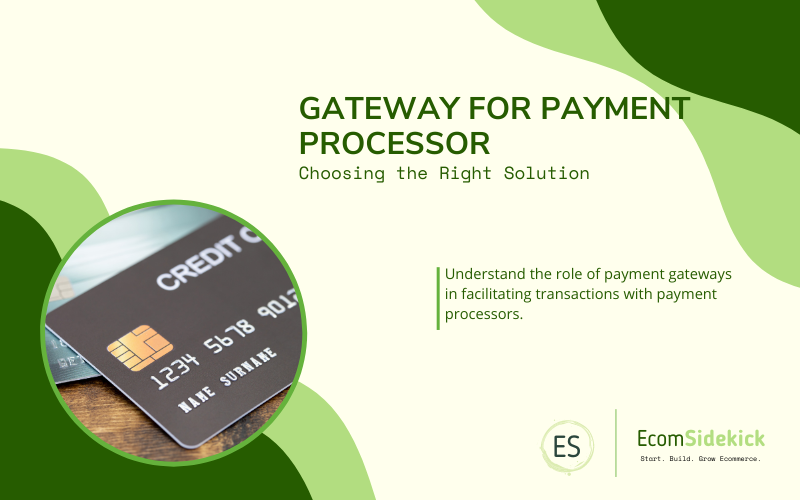The chain of payment processing has many links. Payment processors and payment gateways are the two most important ones. If you manage payments for a business, you have probably come across these phrases. Payment gateways and payment processors undertake significantly different tasks.
Despite the fact that they may seem similar, and do have some similarities. Including the fact that they are both directly involved in the processing of payments. In this article, we will look if do you need a gateway for payment processor.

Related article: How to Properly Set Up Your Ecom Business
What Is A Payment Gateway?
A payment gateway, as its name implies, is a virtual “gate” that a transaction must pass through in order to proceed with the payment process. A payment gateway is a transaction system for different companies, such as online merchants, and service providers to accept credit card and debit card payments.
A payment gateway must be installed for an online business to receive credit card payments, as well as any other payment options that clients may want. Since there are many different gateway types and selecting the appropriate one for your business might be difficult.
Is It Safe?
The payment gateway encodes the payment data along the route to ensure the security and protection of all sensitive transaction data. The payment gateway serves as another deterrent to fraudsters.
Among other security precautions to assure safety and privacy. It contains a comprehensive security system, automatic rules based on artificial intelligence and anti-fraud filters.
The gate transmits and receives the transaction data necessary to confirm the payment. It will determine things like whether the credit card information is accurate and whether the customer has enough money. The payment gateway sends its conclusion back to your website after approving or rejecting customer transactions.
Any type of payment transaction requires the use of a payment gateway.
What Is A Payment Processor?
The payment gateway transmits transaction data and accepts or rejects payments when an online sale is performed. It does not, however, address how the money is actually processed. The payment processor steps in at this point.
The payment processor acts as a middleman between the payment gateway, acquiring bank, issuing bank and cardholder merchant. A merchant selects a business or financial institution as a payment processor to handle online payments made.
Payment processors do more than just connect payment systems. They also provide their own unique software. To handle, preserve, and analyze the merchant’s transactions, this software is connected into the client’s website.
Selecting the best payment processing company will not only facilitate a positive client experience. Yet, it will also increase your conversion rate thanks to an improved and simple payment gateway.
Do You Need Both?
Both a payment gateway and payment processor are necessary to enable your customers to make purchases both in-person and online. Especially if you want to provide them a smooth, multichannel shopping experience. Thus, for the best experience, both are needed.
What To Look Out When Choosing Your Gateway for Payment Processor

As you can see, it is important that you use a payment processor and gateway together. There are a few things you need to consider when looking for a provider.
Ensure It Works With Your Tools And Software
It’s critical to establish whether any coding is required. In addition to whether the payment processor or gateway you choose can seamlessly interface with the systems you already provide (like Shopify or Mailchimp). This will enable you to start working quicker and save yourself time.
You may create a potent omnichannel strategy for your eCommerce company by selecting a platform that offers numerous customization choices.
Check Rates And Prices
Pricing should also be taken into consideration because many service providers impose transaction fees of up to 2% and frequently demand multi-year contracts. Choose a service provider who offers open pricing options and contracts that specify exactly what is included by the monthly or yearly plan.
Therefore, you won’t be taken by surprise when you see your bill.
Ensure Provider Offers Latest Payment Options
You want to make sure that your company is as future-proof as necessary. To do this, opt for a payment processor which provides a variety of safe payment methods for both online and in-person transactions. Verify that the in person service you employ can accept cards from clients who swipe, tap, or dip their cards.
By allowing the most payment options and credit cards, you can decrease online shopping basket abandonment. You can be confident that they’ll finish their payment with you by giving your clients control over how they want to pay and ensuring their online security.
Final Thoughts
A payment processor carries out the transaction, while a payment gateway is a product or service that authorizes or rejects transactions connecting your website and your clients. You can’t have one without the other as a rule. Together, they both work in harmony with each other.
There are a lot of payment processors and gateway providers out there that you choose from. It is important to find one that suits your needs and goals. We have outlined the main factors that you need to consider when you are browsing.
We hope this article has helped you to understand whether you need both a payment processor and payment gateway.
Frequently Asked Questions
Do You Require Multiple Payment Gateways?
You may offer a range of payment methods and let clients pay in their currency of choice by utilizing different payment gateways. Your company becomes scalable and versatile as a result.
Is PayPal a Payment Gateway or Processor?
You may easily start selling thanks to the PayPal Commerce Platform, which offers a payment processor and gateway in one.
Why Do Payment Gateways Charge So Much?
Payment gateway charges assist service providers for a variety of expenses. Like software upkeep, security, and other operational expenditures.
Paul Martinez is the founder of EcomSidekick.com. He is an expert in the areas of finance, real estate, eCommerce, traffic and conversion.
Join him on EcomSidekick.com to learn how to improve your financial life and excel in these areas. Before starting this media site, Paul built from scratch and managed two multi-million dollar companies. One in the real estate sector and one in the eCommerce sector.

